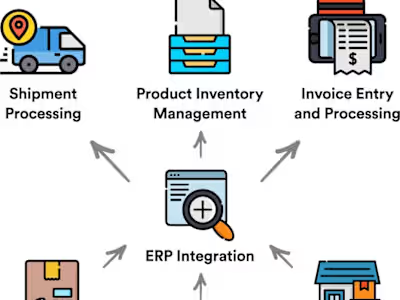Implementing ERP for Retail POS
Like this project
Posted Sep 19, 2023
Project is designed to modernize and optimize our retail operations by introducing an integrated ERP system. This initiative aims to streamline and enhance the.
Project Objectives:
Sales and Checkout: Implement a user-friendly and efficient POS system that enables quick and accurate sales transactions, integrates with various payment methods, and enhances the customer checkout experience.
Inventory Management: Integrate inventory control features to ensure real-time stock visibility, reduce overstock and stockouts, and improve inventory turnover.
Customer Relationship Management (CRM): Develop CRM capabilities to capture and analyze customer data, enabling personalized marketing, loyalty programs, and better customer service.
Financial Management: Implement accounting and financial modules to automate financial processes, including invoicing, expense tracking, and financial reporting.
Reporting and Analytics: Create robust reporting and analytics tools to gain insights into sales trends, customer preferences, and store performance.
Multi-Location Support: Ensure scalability and compatibility with multi-store retail chains, allowing for centralized management and reporting.
Project Phases:
Planning and Requirements Gathering:
Vendor Selection:
Customization and Configuration:
Data Migration:
Testing and Quality Assurance:
Training and Change Management:
Deployment and Go-Live:
Post-Implementation Support and Optimization:
Project Timeline: The ERP implementation project is expected to take approximately 9-12 months, depending on the complexity and scale of the ERP system and the retail operations.
Budget: The budget for this ERP implementation project will be finalized during the planning phase but is estimated to be in the range of [insert budget range].
Key Stakeholders:
Retail Management Team
IT Department
Finance Department
Sales and Store Staff
ERP Implementation Team (including project manager, consultants, and developers)
Success Criteria:
Faster and more accurate sales transactions.
Improved inventory management and turnover.
Enhanced customer relationships and loyalty.
Streamlined financial processes and accurate reporting.
Data-driven decision-making.
Scalability for multi-store operations.
Minimal disruption during deployment.
Risk Management:
Identify potential risks such as data migration challenges, system downtime, or resistance to change.
Develop mitigation strategies and contingency plans.
Conclusion:Implementing an ERP system for our retail POS operations is pivotal in modernizing our retail business, improving customer service, and ensuring long-term growth and competitiveness. This project will position our retail operations for greater efficiency, profitability, and adaptability in the evolving retail landscape.






